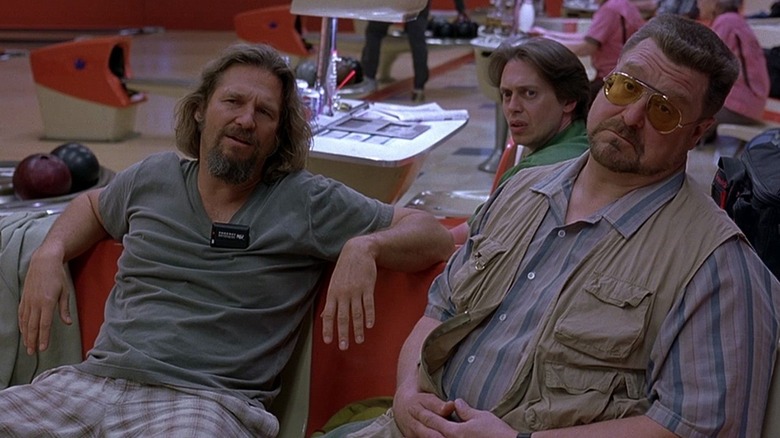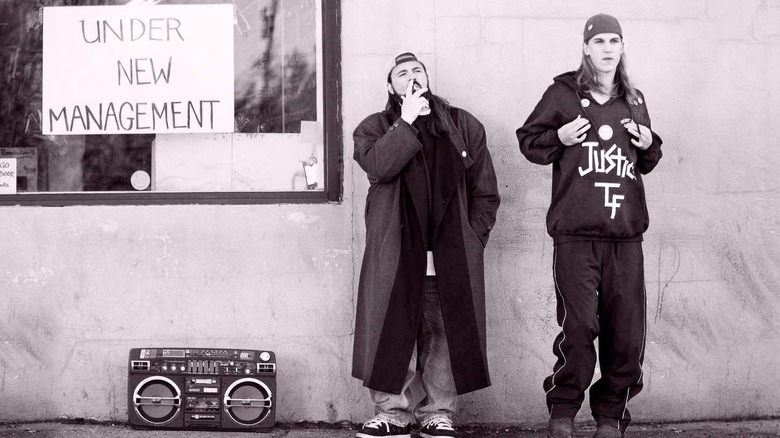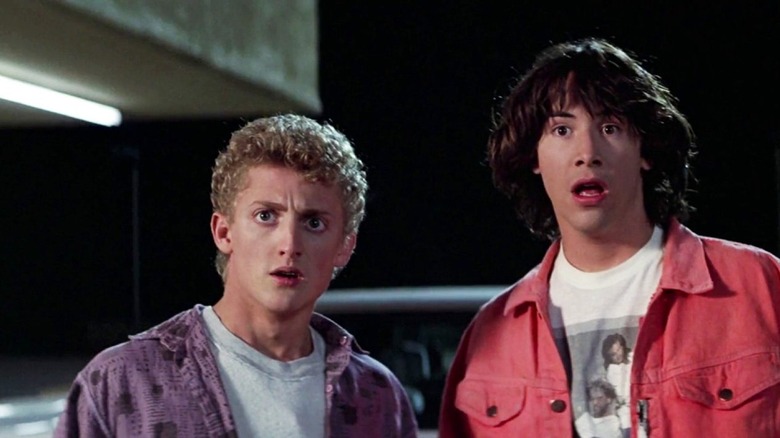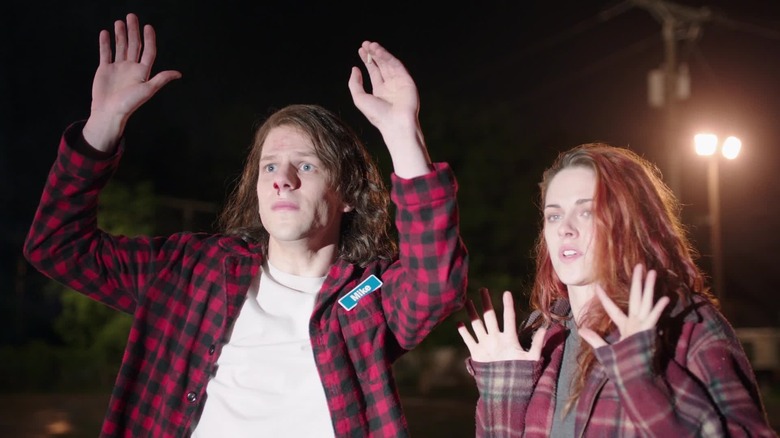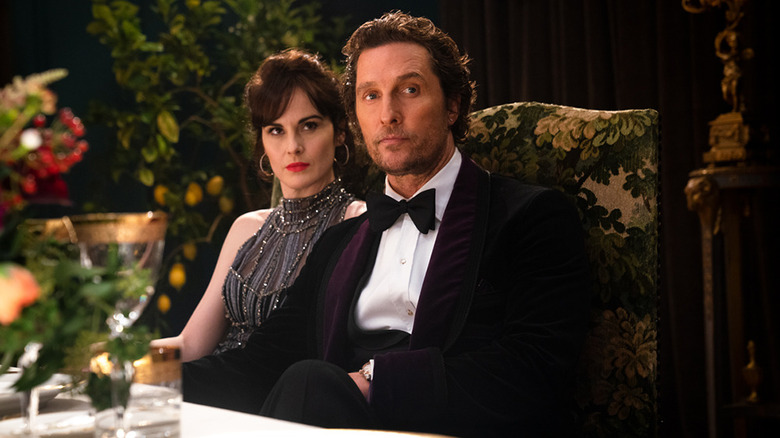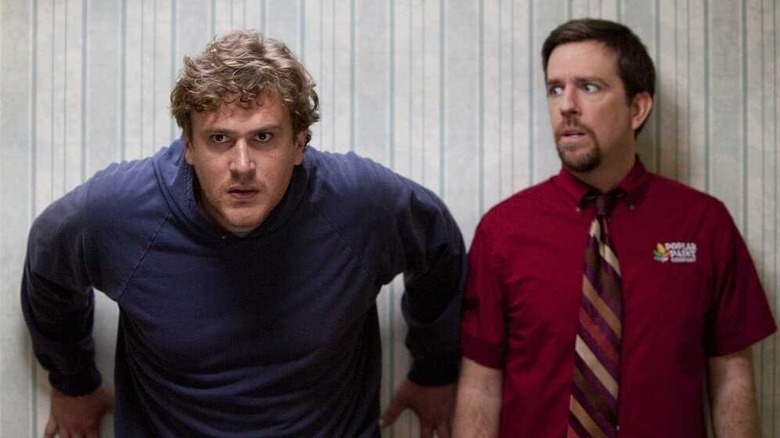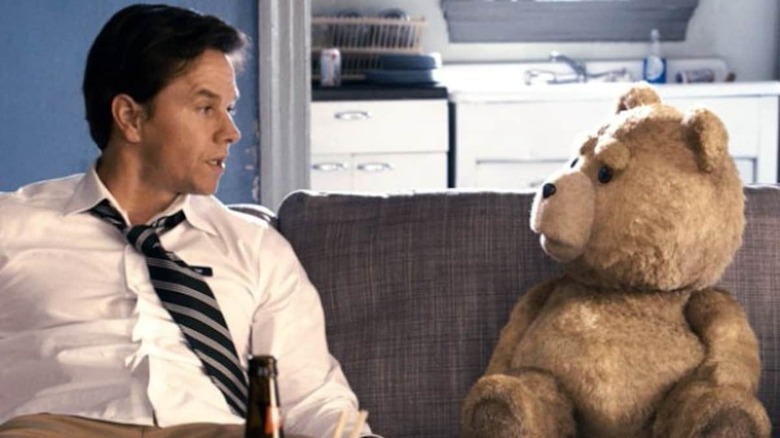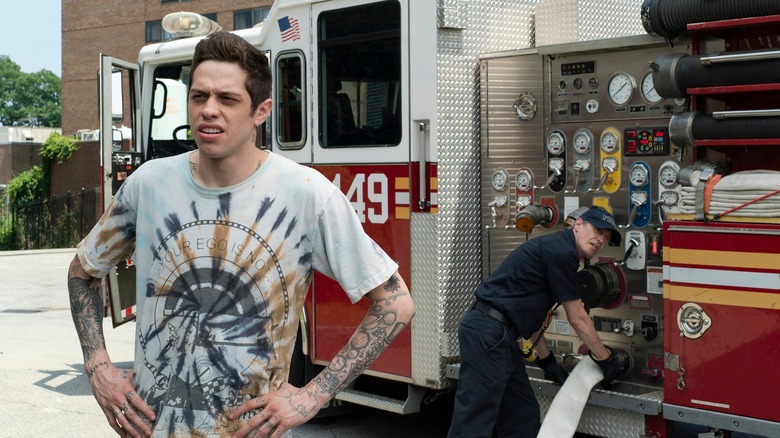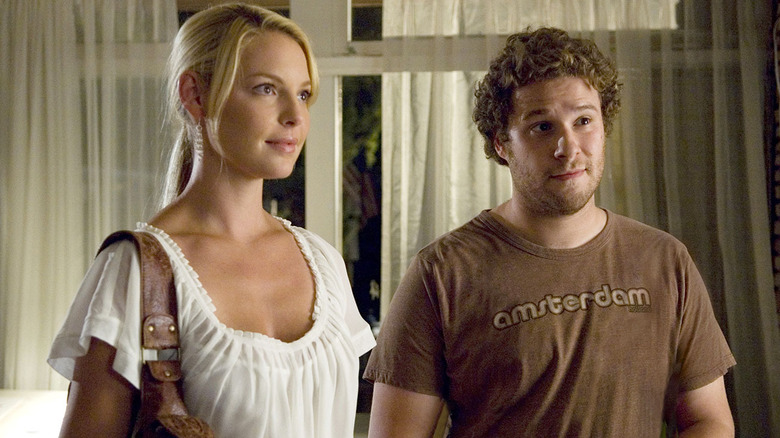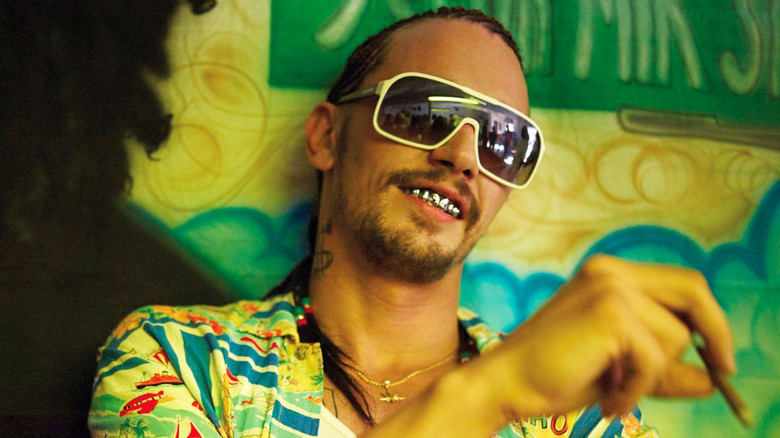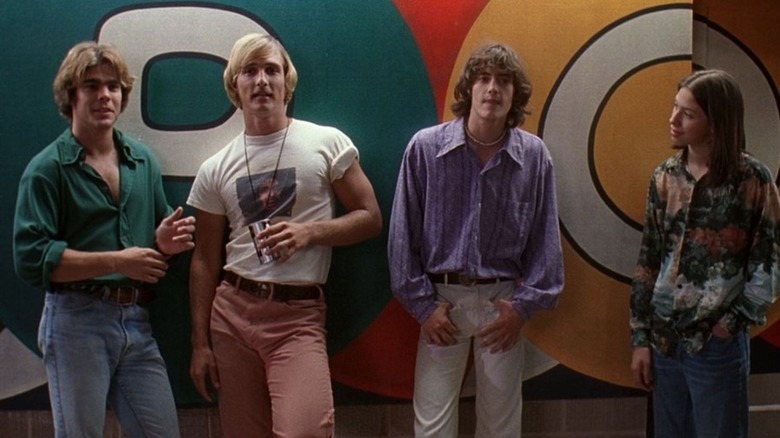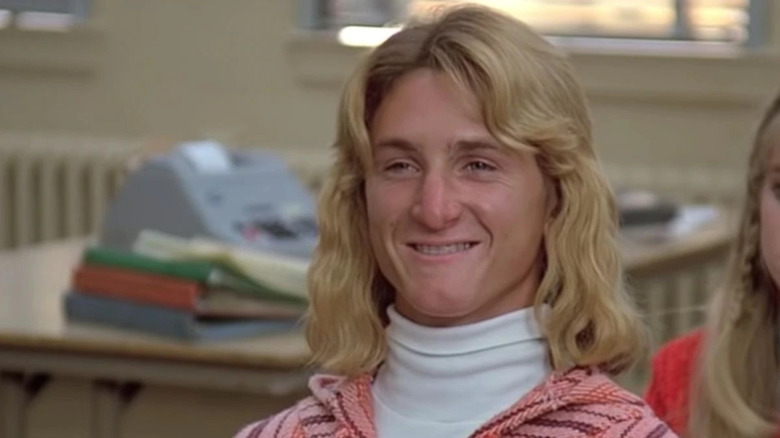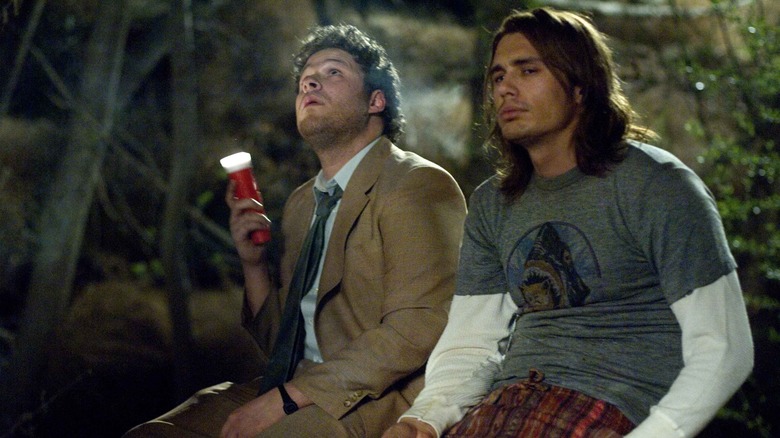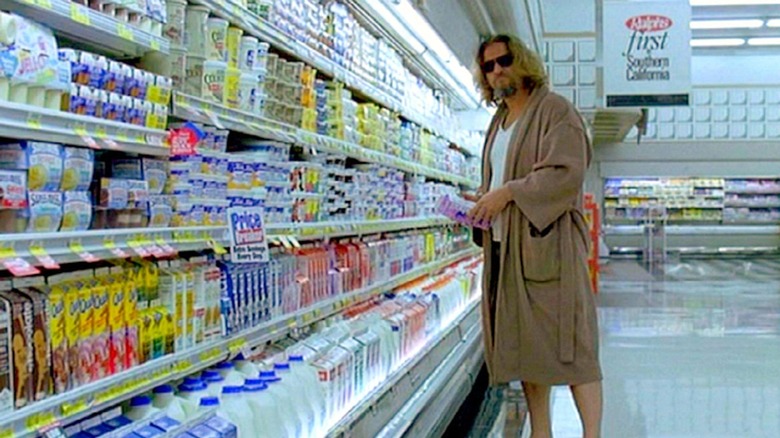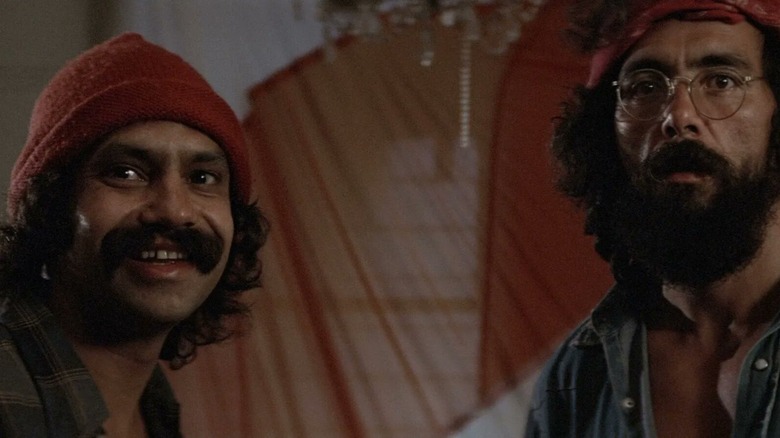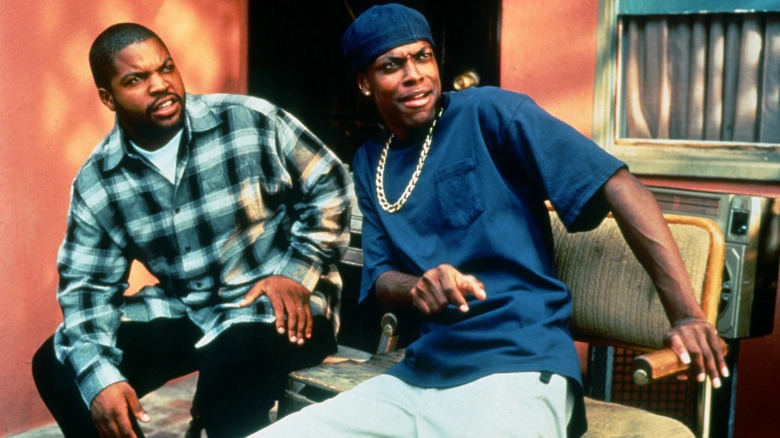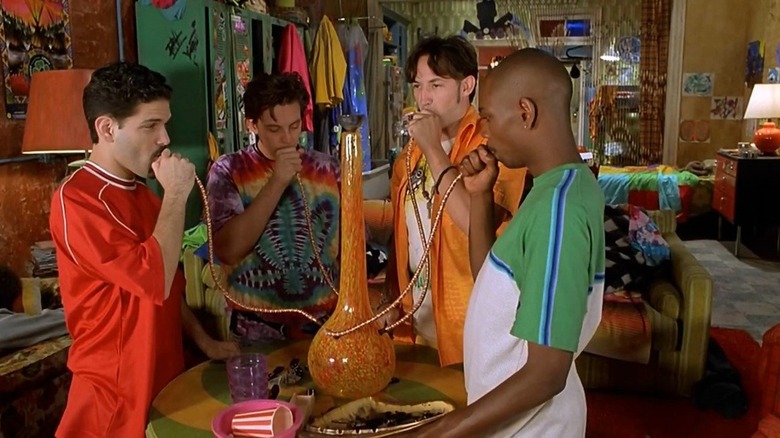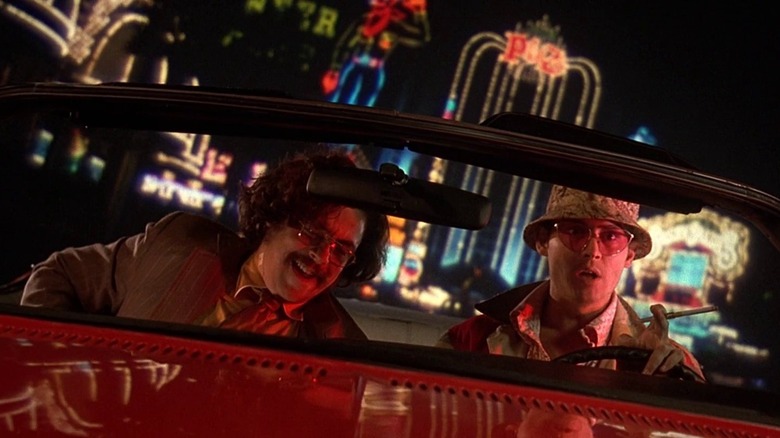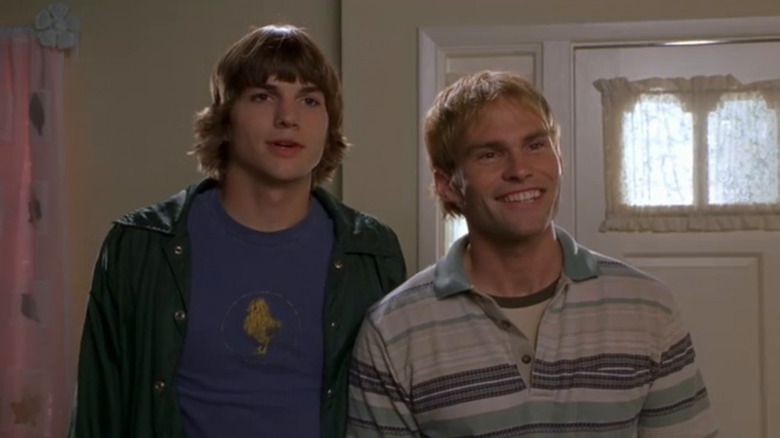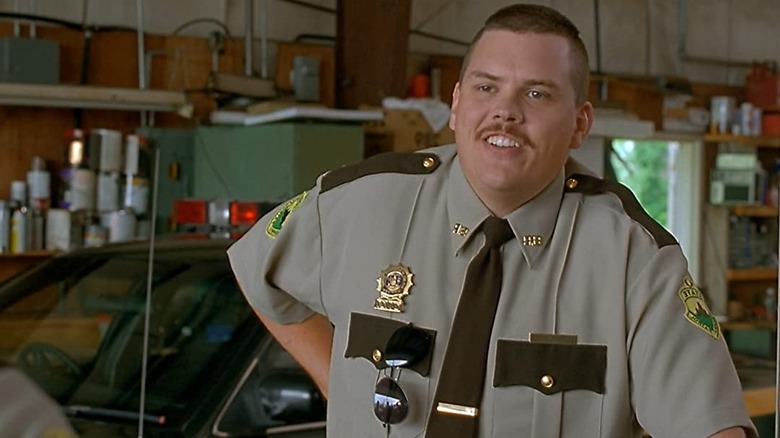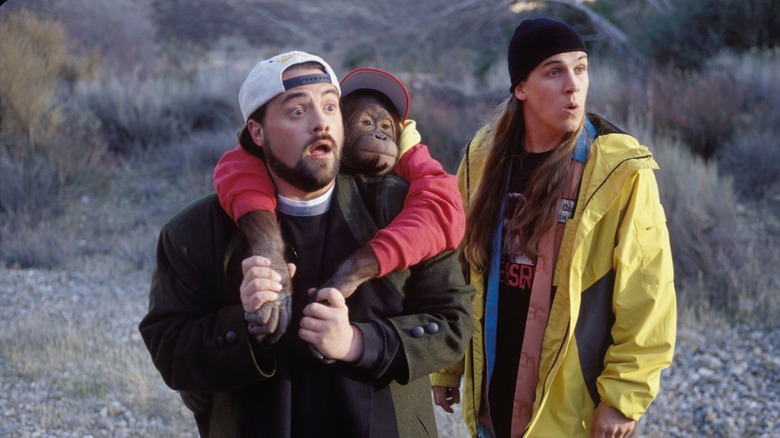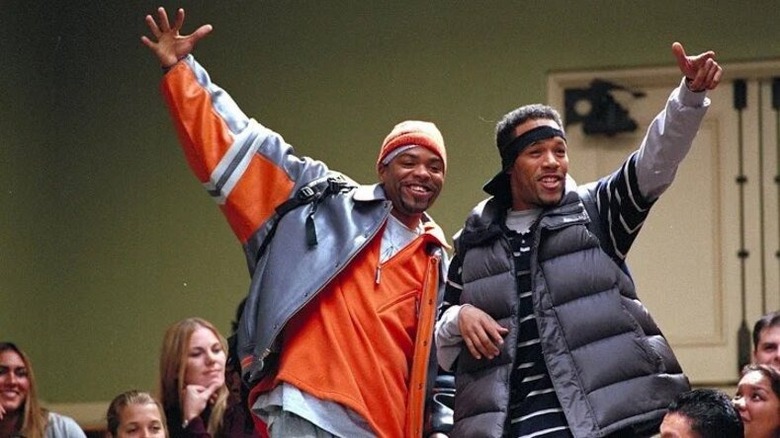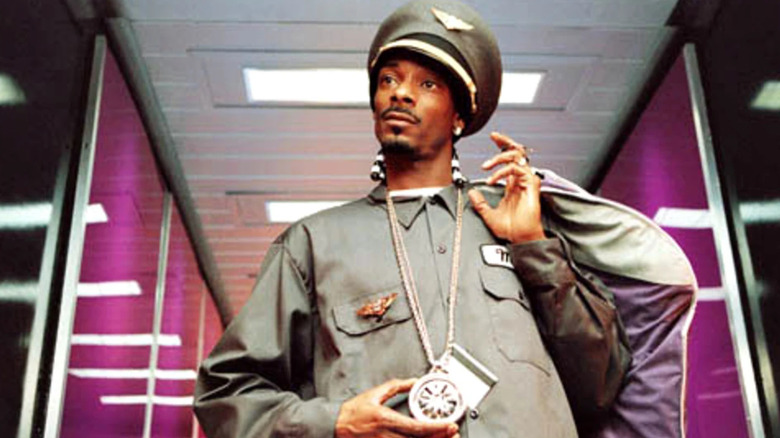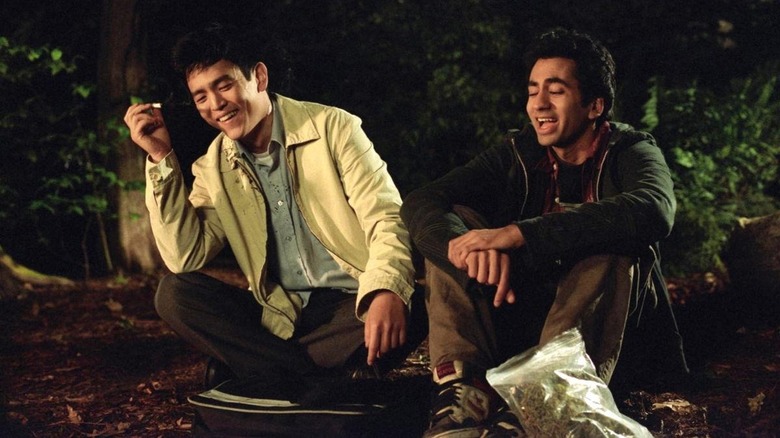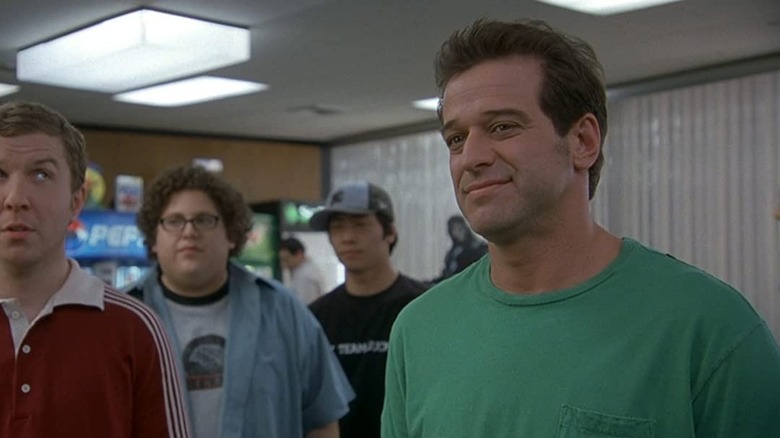The 26 Best Stoner Movies Ever Made
We may receive a commission on purchases made from links.
Hollywood sometimes deserves credit for being at the forefront of social issues. You wouldn't necessarily think of a "stoner comedy" as a particularly "progressive" genre, but some of the wackiest weed-related films were actually important moments in representation. The 1978 romp "Cheech and Chong's Up in Smoke" wasn't only the first modern stoner movie, but a film with two Mexican leads in an era of extreme discrimination. Decades later, the "Harold and Kumar" series had a similar impact with its Asian characters.
Stoners are often used as comedic side characters. Would "The Cabin in the Woods" be nearly as funny without Fran Kranz's "fool" Marty Mikalaski? Now imagine "Galaxy Quest" without Tony Shalhoub's Fred Kwan. The success of films like "Pineapple Express" has led to a greater acceptance of stoner characters in mainstream films, and there are many filmmakers who aren't shy about their favorite pastime. Kevin Smith hasn't only created iconic stoner characters, he's actually sold his own strains. Like any niche genre, a great weed movie should appeal to a wider audience than just smokers. You don't have to be a boxer to enjoy "Rocky," and you don't need any theater experience to appreciate "Singin' in the Rain." Similarly, even non-smokers are able to get a laugh out of the stoner classics. Here are the 15 greatest stoner movies ever made.
Clerks (1994)
While some filmmakers have created stoner protagonists and even started recurring franchises, Kevin Smith has an entire cinematic universe of pothead characters. Dante Hicks (Brian O'Halloran), Randall Graves (Jeff Anderson), Holden McNeil (Ben Affleck), Alyssa Jones (Joey Lauren Adams), and of course Jay (Jason Mewes) and Silent Bob (Smith himself) have appeared in the interconnected "View Askewniverse" for nearly three decades. It's one of the strangest consistent franchises, and it's not set to conclude anytime soon. "Clerks III" is set for release later this year, and Smith has continued to develop "Twilight of the Mallrats."
However, the original "Clerks" was the one that started it all, and the film's production is a great underdog story in its own right. Smith maxed out his credit cards in order to shoot a low-budget black-and-white comedy at the same convenience store he was working at. Shot in three weeks by Smith and his friends (who had no prior filmmaking experience), the film became a sensation and even made its way to the Cannes Film Festival. "Clerks" has a brilliantly simple premise: It's about bored retail employees who pass the time by talking about "Star Wars," something many of us can relate to.
Bill & Ted's Excellent Adventure (1989)
"Bill & Ted's Excellent Adventure" may have slipped by with a PG rating because the titular two heroes don't actually smoke on screen, but it doesn't take a genius to understand the implications. The two high school slackers and aspiring musicians share obvious characteristics with weedhead archetypes. The film's time travel premise certainly feels like it could be the result of a particularly hazy trip.
What makes "Bill & Ted" unique is that Bill S. Preston Esq. (Alex Winter) and Ted "Theodore" Logan (Keanu Reeves) actually seem like nice guys. Stoners are often characterized as obnoxious losers in films, and while Bill & Ted are quite funny, they're not always the butt of the joke. Neither of them is the brightest bulb, but they're well-intentioned and even well-mannered. Potheads are unfairly seen as lazy, but Bill & Ted have an actual goal in mind to become "Wyld Stallyns" and create music that brings people together. It's no wonder that they're the basis of a future utopian society, as the time traveler Rufus (George Carlin) explains to them.
Inherent Vice (2014)
It may be easy to dismiss the "stoner movie" genre as nothing but a batch of lazy comedies, but some of the greatest filmmakers of our era have tried their hand at weed-related humor. Paul Thomas Anderson is one of the most celebrated filmmakers working today, and his 2014 neo-noir comedy "Inherent Vice" even earned him an Academy Award nomination for best-adapted screenplay. Anderson proved that the hard-boiled mystery genre is a lot more entertaining when your lead detective is so stoned he can hardly walk.
Joaquin Phoenix gives an incredible performance as the private eye Doc Sportello. Doc would rather sit around at home on Gordita Beach than get involved with a murder investigation, but he's burdened by his own inherent goodness. When his ex-girlfriend Shasta Fay Hepworth (Katherine Waterston) asks him for help searching for Mickey Wolfmann (Eric Roberts), he's helpless to do the right thing. Phoenix is absolutely hilarious, as Doc never seems like he entirely comprehends what's going on. This becomes even funnier as he gets wrapped up in the outrageous criminal underworld and his life in danger, completely oblivious to the violence that surrounds him. Anderson deconstructs the investigative genre through Doc's perspective. The conspiracy itself is convoluted to a hilarious degree, and the viewer is left just as confused as Doc is. Our lead simply wanders into situations without recognizing how they're connected and his good nature ends up saving the day.
Under the Silver Lake (2018)
It's nice to see films like the "Bill & Ted" series and "Inherent Vice" that include more positive depictions of stoners, but not every film within the genre does the same thing. What's important about "Under the Silver Lake" is that Andrew Garfield's character Sam isn't a toxic character because he's a stoner; he's just a sexist jerk who happens to enjoy partaking. Weed guides Sam's journey in "Under the Silver Lake," but it's not used to explain why he's such a loser. The fact that he's stoned the whole time actually makes him a tolerable character.
"Under the Silver Lake" is a commentary on toxic masculinity and the seedy underbelly of the entertainment industry that's presented as an investigative mystery. Sam is an aimless, unemployed man living on the outskirts of Hollywood in Silver Lake, California. He's overdue on his rent, but a chance encounter with the enigmatic woman Sarah (Riley Keough) gives him a sense of hope. Sarah disappears after they spend one night together, and Sam is convinced that she's either been kidnapped or become involved in a larger conspiracy. He never stops to consider the possibility that she simply didn't want to see him again. Sam begins searching for subliminal messages in comic books and pop songs with the hope of tracking down Sarah. It's a remarkable performance from Garfield, who seems like one of the nicest actors in the industry in real life, but he completely transforms into this reprehensible character.
American Ultra (2015)
Smoking may empower some people, and in "American Ultra" that's literally the case. The film centers on the stoner Mike Howell (Jesse Eisenberg), who discovers that he's actually a CIA sleeper agent whose lethal abilities can only be activated by a series of code words. It's a comical take on a "Bourne Identity"-style premise if Matt Damon's ruthless assassin was higher than a cloud the whole time. Eisenberg is already an untraditional choice to be an action hero, so having him be perpetually stoned only increases the film's humor.
Eisenberg is also the perfect choice to play a stoner, as he's renowned for his fast-talking, nervous nature. Mike suffers from panic attacks and an overwhelming sense of anxiety, but these characteristics aren't dismissed only as quirks. Mike is struggling to overcome his fear of commitment and actually do something nice for his girlfriend Phoebe Larson (Kristen Stewart). He's not sure why she stays with him, so when their lives are threatened by the CIA conspirators, Mike has an actual goal and something to prove. He wants to be a hero in Phoebe's eyes and prove that her faith in him wasn't misplaced. It's a surprisingly sweet love story, and Eisenberg and Stewart treat the romantic moments with sincerity. "American Ultra" is also a surprisingly effective action movie, and director Nima Nourizadeh is able to blend physical humor in with the set pieces. Eisenberg does a great job showing Mike's confusion as he discovers his new abilities.
The Gentlemen (2019)
Guy Ritchie's "The Gentlemen" doesn't just feature great stoner characters; it's about the marijuana smuggling business itself. Ritchie epitomized the British gangster comedy with his 90s classics "Lock, Stock, and Two Smoking Barrels" and "Snatch," but in the past decade he's mostly directed blockbuster films. "The Gentlemen" saw Ritchie returning to his roots, but the weed-related humor distinguished it from his earlier films.
"The Gentlemen" is framed around a conversation between the eccentric tabloid journalist Fletcher (Hugh Grant) and the mafia enforcer Raymond Smith (Charlie Hunnam). Fletcher is trying to unravel the story of Raymond's employer, the marijuana kingpin Mickey Pearson (Matthew McConaughey). Mickey and his wife Rosalind (Michelle Dockery) form a temporary alliance with the Jewish investor Matthew Berger (Jeremy Strong) as they contend with a Chinese gangster known only as "Dry Eye" (Henry Golding). They're also warding off the threat of an underground gang led by the trainer Coach (Colin Farrell). Fletcher is struggling to keep track of these various players as he faces pressure from his own employer, the corrupt newspaper mogul Big Dave (Eddie Marsan). It's pretty difficult to keep track of how the stacked cast relates to each other and who is betraying who. Ritchie makes it clear that it's probably best enjoyed while you're high.
Jeff, Who Lives At Home (2011)
The mumblecore subgenre of indie comedies is perfectly suited for pothead characters. Mumblecore films tend to focus on naturalistic conversations, often improvised on set. There's rarely a consistent narrative arc, as these films are more focused on character relationships. Some viewers may even find the mumblecore style aimless or a wee bit pretentious. However, 2012's "Jeff, Who Lives At Home" is a great example of a mumblecore comedy that's creative, original, and surprisingly poignant.
"Jeff, Who Lives At Home" centers on Jason Segel's titular unemployed stoner, who as the title suggests still lives with his mother Sharon (Susan Sarandon) and struggles socially. Jeff rarely leaves the basement, but a mysterious phone call inspires him to go outside and track down the caller. He is reunited with his obnoxious brother Pat (Ed Helms), who fears that his girlfriend Linda (Judy Greer) is cheating on him. Pat forces Jeff to help him determine the truth, and the experience ends up bringing them closer together.
Ted (2012)
Seth MacFarlane is no stranger to weed humor, frequently featuring stoned characters on his animated shows "Family Guy," "American Dad," and "The Cleveland Show." Those series were foundational in the development of adult animated sitcoms, and the stoner humor helped distinguish them. When MacFarlane made his feature film directorial debut, he tackled another premise that wouldn't normally be associated with R-Rated humor.
The 2012 movie "Ted" has a charming opening that follows the young boy John Bennett throughout his difficult childhood. John is relentlessly bullied and dreams about having a best friend, and on one fateful Christmas morning he's delighted to find that his new teddy bear has come to life. The two become inseparable, but once they grow up John (Mark Wahlberg) must decide how to balance his relationship with Lori Collins (Mila Kunis) and his lifelong friendship with Ted (voiced by MacFarlane), who doesn't have any priorities beyond smoking and partying. Despite the raunchy premise, "Ted" is a surprisingly sweet story of friendship and growing up.
The King of Staten Island (2020)
As with any sub-genre of comedy, a "stoner movie" can use humor as a gateway to tell a very personal story. Pete Davidson is among the most popular breakout stars in the recent history of "Saturday Night Live." His awkward, blunt humor frequently includes weed-related gags. "The King of Staten Island" tells the semi-autobiographical story of Davidson's life, as he co-wrote the screenplay with Dave Sirus and the film's director Judd Apatow.
Davidson's stand-in character is Scott Carlin, a tattoo artist who lives with his mother Margie (Marisa Tomei) and sister Claire (Maude Apatow). The latter is preparing to go to college, and Margie hopes that Scott will finally grow up and leave home so she can begin dating again. Scott is still coping with the death of his father, a firefighter killed during 9/11. He is forced to accept his trauma when his mother begins dating another firefighter, Ray Bishop (Bill Burr).
Knocked Up (2007)
Stoner comedies like the "Cheech and Chong" or "Harold and Kumar" franchises focus on the wildest possible scenarios that could occur under the influence of marijuana, but Judd Apatow's 2007 film "Knocked Up" presented a very realistic one. After a drunken one-night stand, weed enthusiast Ben Stone (Seth Rogen) and television journalist Alison Scott (Katherine Heigl) part ways with no intentions of seeing each other again. They're forced to reunite when Alison realizes she is pregnant.
Ben can't even find a consistent job, so he's completely unprepared for the responsibilities of parenthood. Alison faces similar anxieties, as she knows that having a child is a major burden for a woman working in the media industry. While the film is a romantic comedy, a lot of the best jokes are stoner gags. Ben's pothead friends played by Jason Segal, Jonah Hill, Jay Baruchel, and Martin Starr add humorous commentary throughout his experiences.
Spring Breakers (2013)
Auteur writer/director Harmony Korine has a very unique style, but "Spring Breakers" is about as wild and experimental as films can get. Korine is able to create unique characters and authentic situations, and his humor can be both bizarre and disturbing. The film combines the stoner movie genre with crime, horror, social commentary, and an odd bit of existentialism.
"Spring Breakers" centers on Faith (Selena Gomez), Brit (Ashley Benson), Candy (Vanessa Hudgens), and Cotty (Rachel Korine), four college girls that aim to escape their dull coursework with an exciting spring break adventure. When they find that they don't have enough money to afford the Florida vacation of their dreams, the girls decide to wear ski masks and rob a bank. They are introduced to an eccentric stoner and rapper only known as "Alien" (James Franco). In one of the best performances of his career, Franco creates a perpetually-blitzed character that is both hilarious and terrifying.
Dazed and Confused (1993)
Sometimes the best thing to do while you're high is just hang out with friends. Writer/director Richard Linklater has mastered the art of the "hangout movie" thanks to his authentic dialogue, so his films feel like slices of life with characters so memorable that it's thoroughly enjoyable to just watch them have everyday conversations. Linklater's 1993 coming-of-age comedy "Dazed and Confused" is one of the greatest one-crazy-night hangouts ever put on film.
The '70s-set film centers on a group of incoming freshman boys attempting to survive their last day of high school in Austin (Linklater's hometown). Mitch Kramer (Wiley Wiggins) and his friends are avoiding the cruel senior class, who hunt them down for a yearly hazing ritual. Mitch escapes his pursuers early in the day, but after a baseball game he's cornered by the particularly evil Fred O'Bannion (Ben Affleck). Mitch is forced to grow up overnight as he begins partying, drinking, and smoking after he meets the senior Randall Floyd (Jason London).
Fast Times At Ridgemont High (1982)
Sean Penn is one of the greatest dramatic actors of the past few decades, so it's somewhat surprising that his breakout performance was the role of eccentric stoner Jeff Spicoli in the 1982 coming-of-age classic "Fast Times At Ridgemont High." The film is far raunchier than most of the other high school films of the '80s. Despite the outrageous moments, "Fast Times At Ridgemont High" is very authentic. The film was written by Cameron Crowe (in an adaptation of his own novel), which is based on his experiences going undercover at Clairemont High School in San Diego.
The film centers on the awkward romantic experiences of the sophomores Stacy Hamilton (Jennifer Jason Leigh) and Mark Ratner (Brian Backer). While their experiences are very relatable, Spicoli is the most entertaining aspect of the film. He creates havoc in class, and the history teacher Mr. Hand (Ray Walston) desperately tries to punish him.
Pineapple Express (2008)
Many of the most famous stoner franchises such as "Cheech and Chong," "Harold & Kumar," and "Jay and Silent Bob" center on buddy duos. David Gordon Green's 2008 comedy "Pineapple Express" created a new weed bro duo worthy of these classics. The film follows the computer process server Dale Denton (Seth Rogen) as he goes to pick up marijuana from his supplier Saul Silver (James Franco). Dale may be lazy, but Saul has no motivation to do anything but sit in his apartment and smoke.
Dale accidentally witnesses a murder when he sees the drug lord Ted Jones (Gary Cole) and corrupt police officer Carol Brazier (Rosie Perez) shoot an unarmed civilian. He and his dealer (a joint Dale leaves at the crime scene leads back to Saul) are forced to go on the run as Ted's gang tries to track down and silence them. "Pineapple Express" is a surprisingly engaging action film, but having two perpetually stoned characters makes it even more hilarious.
The Big Lebowski (1998)
There aren't a lot of writer/directors who have created as many iconic characters as the Coen Brothers. Jeff Bridges' philosophical stoner "The Dude" from "The Big Lebowski" may be their greatest creation ever, as there aren't a lot of characters who have inspired an actual religion. The hilarious 1998 film launched a cult following and continues to spark wild theories and interpretations to this day. However, it's a very accessible film, and first-time viewers shouldn't have an issue connecting with the Coens' unique sense of humor.
The Dude and his best friends Walter Sobchak (John Goodman) and Donny Kerabatsos (Steve Buscemi) love to go bowling. Their relaxing pastime is interrupted when The Dude is mistaken for another man named Jeffrey Lebowski (David Huddleston), a millionaire they refer to as "The Big Lebowski." The Dude becomes wrapped up in a crime subplot after he's approached by The Big's wife Maude (Julianne Moore).
Up in Smoke (1978)
The definitive stoner comedy, which effectively catapulted the genre into the Hollywood mainstream, is 1978's "Up in Smoke," starring counterculture comedy duo Cheech Marin and Tommy Chong. Amateur musicians Anthony "Man" Stoner (Chong) and Pedro de Pacas (Marin) evade the law and try to find a way to make a quick buck as they go on an extended odyssey between Los Angeles and Tijuana. Along the way, the pair smoke plenty of marijuana and drop acid as they embark on this cross-country trip in a van made largely from hardened THC resin as the ultimate stoner-mobile.
"Up in Smoke" feels more like a collection of loosely connected adventures than a solid, overarching story, with this narrative structure becoming a recurring formula for subsequent stoner comedies. Right from its opening scenes, the gross-out gags and subversion of authority figures run heavily throughout the film, playing right into Cheech & Chong's clear comedic strengths. An immensely important film for big screen comedies, many later films in the stoner sub-genre are heavily influenced by "Up in Smoke" whether they're conscious of its impact or not.
Friday (1995)
Films, like "Boyz n the Hood" and "Menace II Society," depicting the harsh life on the streets of Los Angeles began to redefine the Black experience in America for moviegoers in the early '90s. Actor and screenwriter Ice Cube sought to reframe his neighborhood in a more positive light, drawing from his own experiences with co-writer DJ Pooh in the 1995 film "Friday," (per Complex). A stoner comedy grounded in South Central realism, Cube stars as 20-something slacker Craig Jones trying to avoid trouble when his best friend and drug dealer Smokey (Chris Tucker) incurs a local criminal's wrath.
"Friday" doesn't compromise on how tough South Central can be, with the constant threat of violence looming over Craig and Smokey, but finds humor and joy within daily life in the neighborhood as well. Cube and Tucker play off each other well as comedic foils, with Tucker's loud-mouth stoner performance perfectly complementing Cube's more deadpan comical acting chops. With a surprising amount of insight into life and love from the perspective of its two charming stoners, "Friday" is a modern comedy classic.
Half Baked
Years before his comedy specials sparked (justifiable) outrage over transphobic jokes, Dave Chappelle starred in the 1998 stoner comedy "Half Baked" with several of his fellow comedian buddies. The movie follows four stoner friends living together in New York City who go into business as amateur drug dealers specializing in marijuana. As Thurgood Jenkins (Chappelle) tries to keep the true nature of his job a secret from his girlfriend (Rachel True), the quartet's budding business is threatened by local drug czar Samson (Clarence Williams III).
Thoroughly quotable, "Half Baked" is buoyed by its unabashedly goofy performances from its four leads, with Chappelle and Jim Breuer as the most memorable of the four. Joining in on the fun is a whole parade of cameo appearances, including a pre-"Daily Show" Jon Stewart and Bob Saget, in complete contrast to his family-friendly father role in "Full House." A hilarious love letter to the possibilities of pot, "Half Baked" is a bonafide cult classic and the strongest comedic showcase for Chappelle on film, rather than on television or the standup stage.
Fear and Loathing in Las Vegas
If there was ever a comedy that feels like an extended bad drug trip, it's 1998's "Fear and Loathing in Las Vegas," adapting Hunter S. Thompson's 1971 novel of the same name. Inspired by some of Thompson's own real-life experiences, stoner friends Raoul Duke (Johnny Depp) and Dr. Gonzo (Benicio del Toro) go on a road trip together to Las Vegas in 1971. They're high on mescaline when they start their journey and have a stash full of illegal contraband to last the trip as they immerse themselves in Sin City.
With its unfocused cinematography and Raoul's mile-a-minute dialogue guiding the audience throughout the film, "Fear and Loathing in Las Vegas" is an off-balance odyssey. As Raoul and Gonzo take different drugs across their lost weekend, the film's tone and cinematography abruptly alter accordingly to reflect their changed perspective. Luridly surreal, "Fear and Loathing in Las Vegas" is a movie that revels in the extremes of its hedonistic protagonists as they guide viewers on this darkly humorous rollercoaster through Vegas' excesses.
Dude, Where's My Car?
2000's "Dude, Where's My Car?" speaks to a very specific subsection of millennial comedic sensibilities, connecting best with those who were teens or young adults when it debuted. Friends Jesse Montgomery (Ashton Kutcher) and Chester Greenburg (Seann William Scott) wake up with a tremendous hangover, with no memory of the night before or the whereabouts of Jesse's car. Jesse and Chester retrace their steps to locate Jesse's car in time to meet up with their girlfriends in time for their anniversary.
"Dude, Where's My Car?" gets more outlandish as it progresses, venturing into hard science fiction as Jesse and Chester find themselves in the middle of an extraterrestrial conspiracy. Really, the only thing that makes the whole movie work is Kutcher and Scott's complete willingness to play innocent buffoons who are just along for the ride. Part "Memento" and part "Bill and Ted," "Dude, Where's My Car?" is more of a showcase for Kutcher and Scott's comedic chops than a cohesive narrative.
Super Troopers
Who says the law can't get in on the stoner laughs? 2001's "Super Troopers," by the Broken Lizard comedy troupe, follows a group of Vermont state police officers who indulge in the banality of their jobs with practical jokes and illicit activities. Feuding with the local police force, the state officers stumble across a massive drug smuggling ring bringing large quantities of marijuana across the Canadian border. Forced to use their wits, these nonsensical state troopers have to put their detective skills to the ultimate test as they unravel this criminal conspiracy.
From encountering motorists stoned out of their minds on acid to confiscated stores of marijuana, "Super Troopers" brings drug-fueled humor often and overtly. Of course, the eponymous troopers are no more composed than the criminals they bust, drunkenly vandalizing their rivals' property and carousing around town. Male protagonists trapped in juvenile antics well into adulthood is a hallmark of stoner comedies, but "Super Troopers" juxtaposes the trope with the unlikeliest profession of all with its easygoing send-up of local law enforcement.
Jay and Silent Bob Strike Back
One of the most notable comedy duos to represent the state of New Jersey is filmmaker Kevin Smith's recurring stoners, Jay and Silent Bob. With Jay played by Smith's longtime real-life friend Jason Mewes and Silent Bob played by Smith himself, the two drug dealers with a heart of gold have appeared in the majority of Smith's filmography. After a number of supporting appearances, Jay and Silent Bob took center stage for the 2001 comedy "Jay and Silent Bob Strike Back."
After Jay and Silent Bob learn a movie is being made about their superhero facsimiles without their consent or compensation, the two marijuana dealers travel from the Garden State to Hollywood to sabotage it. Buoyed by an entire array of all-star guests, including Mark Hamill and Carrie Fisher, "Jay and Silent Bob Strike Back" treads heavily on the self-aware humor of the movie industry. Though Jay and Silent Bob would largely return to supporting roles, the duo's first shift to the spotlight remains one of Smith's most underrated films.
How High
From starring together in a short-lived sitcom to appearing as themselves in a number of video games, hip-hop duo Method Man and Redman have an extensive list of collaborations beyond music. Among the pair's projects is the 2001 stoner comedy "How High," with Method Man and Redman starring as slacker best friends Silas and Jamal, respectively. After smoking their late friend's ashes, he appears to them as a ghost, coaching them academically to enter Harvard on a full scholarship and helping them with their classes.
"How High" feels like a burnt-out fever dream, with the movie reveling in how absurd it can take its fish-out-of-water tale, with Silas and Jamal ruffling the pretentious feathers of Harvard's social elite. From trying to smoke President John Quincy Adams' corpse to gain his intelligence to discovering that Benjamin Franklin was a stoner, "How High" takes full advantage of its stuffy Harvard setting to get the most ridiculous gags possible. Method Man and Redman have a natural chemistry on-screen that helps sell even the wildest moments in the movie, with "How High" as one of the most underrated movies in the stoner comedy genre.
Soul Plane
There is a wish-fulfillment fantasy at the core of 2004's "Soul Plane," a comedy that provides a look at one man getting to launch his dream airline service. After winning a lucrative lawsuit from a horrendous flight experience, entrepreneur Nashawn Wade (Kevin Hart) starts his own airline that caters to Black culture for its sky-high service. With its open drug use and sexual activity while the plane is traveling to its various destinations, Wade's new venture provides a mile-high party as its passengers and crew cruise the open skies.
"Soul Plane" isn't a movie that's going to make a lot of conventional best-of lists, with its entire premise hinging on flagrant racial stereotypes and low-brow humor. However, the movie is instrumental in kickstarting the big-screen career of Hart, who more than holds his own with an impressive ensemble cast. While Snoop Dogg and Method Man provide much of the stoner comedy, "Soul Plane" is a movie that thankfully doesn't take itself too seriously, aware of the overriding absurdity in its premise.
Harold & Kumar Go to White Castle
Though not as prolific as Jay and Silent Bob, stoner duo Harold (John Cho) and Kumar (Kal Penn) starred in their own set of stoner comedies, starting with 2004's "Harold & Kumar Go to White Castle." Smoking together at the start of a stressful weekend, the two friends develop a sudden craving for food from the fast food chain White Castle, going on an impromptu trip through New Jersey to find one. Along the way, Harold and Kumar deal with everything from racist police to Neil Patrick Harris, with the actor playing a drugged-up version of himself.
To be sure, "Harold & Kumar Go to White Castle" is a strange film that feels more like a series of bizarre vignettes as the protagonists embark on their fast food quest. Cho and Penn's comedic chemistry is elevated by a rotating cast to play off of, with Harris and a surprise appearance by Ryan Reynolds among the movie's highlights. Harold and Kumar's subsequent cinematic appearances would prove the law of diminishing returns, but their inaugural outing is a nonsensical road movie that provides easygoing laughs.
Grandma's Boy
The idea of staying at home all day, working as a video game tester, and smoking pot seems like an idealized career goal and serves as the setup for 2006's "Grandma's Boy." 30-something slacker Alex (Allen Covert) has moved into his grandmother's basement and has dreams of creating his own game. As Alex works hard developing the game in his free time, he clashes with his megalomaniacal boss J.P. (Joel Moore), and woos his new co-worker Samantha (Linda Cardellini).
"Grandma's Boy" really doesn't reinvent the wheel and the audience's stance on having Covert as a leading man may vary, but Moore plays a conniving tech bro to the prescient hilt. The film's strength really does lie in its supporting cast, with Cardellini taking what could've been a thankless love interest role and elevating it to match her wacky co-stars. A surprisingly solid stoner comedy, "Grandma's Boy" is an overlooked send-up of the video game industry, with plenty of effective pot-fueled gags.
